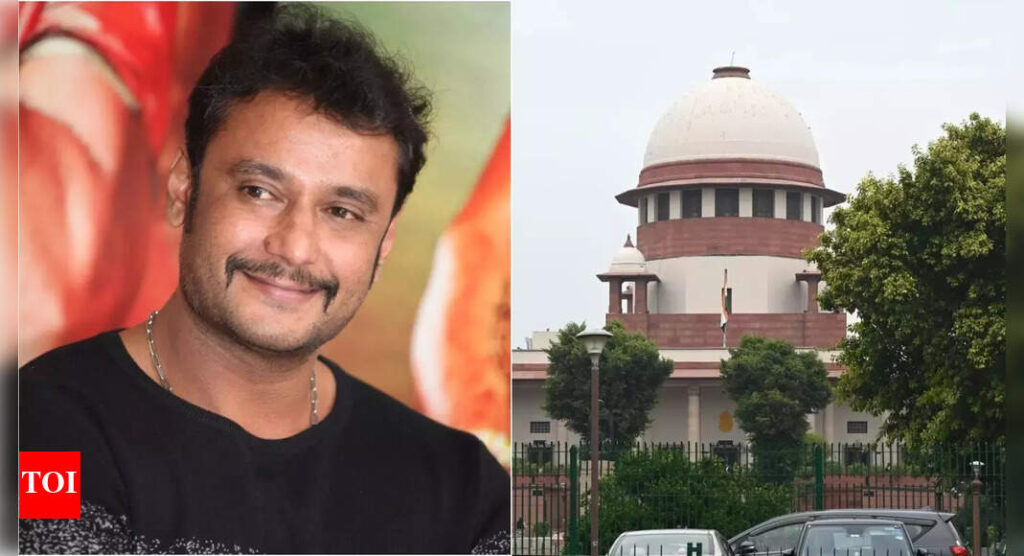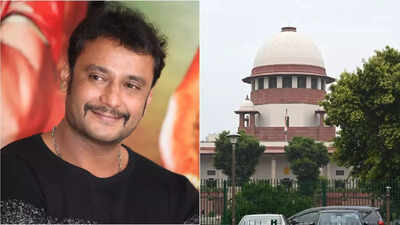‘Non-application of mind’: What Supreme Court observed while cancelling Kannada actor Darshan’s bail; pulls up Karnataka HC for giving ‘acquittal order to accused’ | Bengaluru News

BENGALURU: Cancelling the bail granted to Kannada actor Darshan and his six aides in the Renukaswamy murder case, the Supreme Court Thursday observed that the order of the Karnataka high court depicted “non-application of the mind”.The apex court noted that courts are not expected to render findings on the merits of the case at the bail stage. On Dec 13, 2024, the high court single bench judge Justice S Vishwajith Shetty granted regular bail to Darshan (accused number 2), Pavithra Gowda (accused no 1) along with other accused – R Nagaraju, Anu Kumar alias Anu, Lakshman M, Jagadeesh alias Jagga and Pradoosh S Rao – on grounds of non-furnishing of a memo for reasons of arrest as per the mandate of CrPC, several inconsistencies in statements of witnesses, etc. The state govt challenged the verdict. Now, after 244 days, the Supreme Court reversed the order.During the course of hearing the appeals, the SC bench of Justices JB Paridiwala and R Mahadevan even remarked that the high court had handed out “an acquittal order to the accused”. The bench, in the 66-page order, stated: “In the present case, the high court failed to properly evaluate the nature of allegations, involving premeditated murder and conspiracy, attracting Section 302 of IPC read with Section 120B IPC; the chain of circumstantial evidence, including CCTV footage, call records and forensic report showing a deliberate attempt to destroy evidence (e.g., disposal of blood-stained clothes and vehicle cleaning); and the incriminating role of A2 (Darshan), who was in constant touch with A1 (Pavithra Gowda) and other co-accused before and after the incident, and who facilitated the conspiracy and cover-up. On the other hand, it simply recorded that A2 (Darshan) had ‘no direct role’ and there was ‘no prima facie case’, without discussing or analysing the incriminating material on record. This amounts to non-application of mind and renders the order unsustainable in law.”By treating Darshan’s stature as a mitigating factor, the high court committed a “manifest perversity” in the exercise of its discretion, thereby warranting cancellation of bail. “A2 is not a common undertrial. He enjoys celebrity status, mass following, political clout and financial muscle. His conduct inside jail – including recorded instances of VIP treatment, violations of jail rules and registered FIRs for misuse of facilities – reflects his capacity to defy the system even while in custody. If a person can subvert the prison system, the risk of interference with evidence, threatening or influencing witnesses and tampering with the course of justice is both real and imminent,” the top court observed.Misconduct & influence Moreover, Darshan’s immediate return to social events sharing the stage with prosecution witnesses, and continued influence over police witnesses, despite being on bail, establish that his liberty is a threat to the integrity of the proceedings, the court noted. “Granting leniency to such persons despite grave charges of conspiracy and murder sends the wrong message to society and undermines public confidence in the justice system. Accordingly, the accused’s antecedents, influence, jail misconduct, and the seriousness of the charges against him make him unfit for bail,” the SC stated.The apex court noted that on a cumulative analysis, it is evident that the high court suffers from serious legal infirmities. The order fails to record any special or cogent reasons for granting bail in a case involving charges under Sections 302, 120B and 34 of IPC. Instead, it reflects a mechanical exercise of discretion, marked by significant omissions of legally relevant facts. Moreover, the high court undertook an extensive examination of witness statements at the pre-trial stage, highlighting alleged contradictions and delays – issues that are inherently matters for the trial court to assess through cross-examination. The trial court alone is the appropriate forum to evaluate the credibility and reliability of witnesses, the SC observed.






